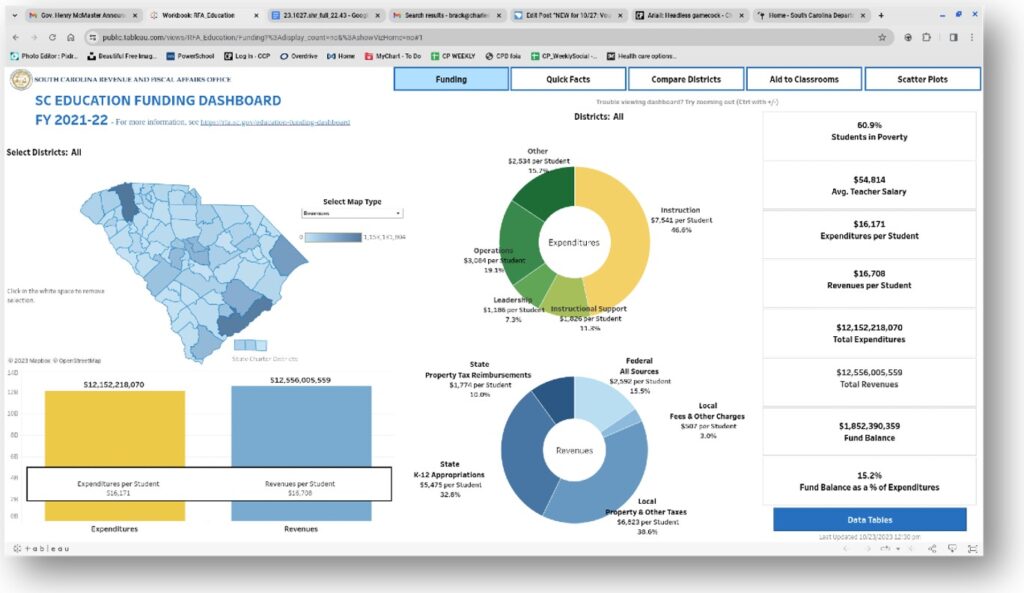STATEHOUSE REPORT | ISSUE 22.43 | Oct. 27, 2023
BIG STORY: Parents, education groups challenge state’s new private school vouchers
NEWS BRIEFS: State launches new online school accountability dashboard
LOWCOUNTRY, Ariail: Not a costume
COMMENTARY, Brack: Deal with liquor liability insurance crisis at bars, restaurants
SPOTLIGHT: The Felkel Group
MYSTERY PHOTO: Dizzying
FEEDBACK: Send us your thoughts
Groups challenge state’s new private school vouchers

By Lily Levin | The South Carolina Department of Education is facing a lawsuit filed Thursday with the state Supreme Court by parents and education advocates challenging the state’s new Education Scholarship Trust Fund voucher program.
In the lawsuit, plaintiffs claimed that the fund, which could divert millions of dollars of state funds from public schools to private schools, violated the state constitution because it bars use of “public funds for the direct benefit of private educational institutions.” Those suing the department included the South Carolina State Conference of the NAACP, the South Carolina Education Association and six public school parents represented by lawyers from South Carolina firms and national education nonprofits.
According to the Associated Press, the program would allow up to 15,000 students to access $6,000 annually in publicly funded savings accounts for private K-12 tuition. That’s the equivalent of $90 million, or about 0.7% of the annual state budget.
The complaint cited a precedent from a previous case, Adams v. McMaster, in which the state Supreme Court struck down federal COVID grant money for one-time private school vouchers.
This most recent program, plaintiffs argue, would require much more funding than Adams, a case already declared unconstitutional.
As of Friday morning, the Education Department did not respond to the Charleston City Paper’s request for comment. But according to published reports. Gov. Henry McMaster told reporters Thursday he was confident the law would withstand judicial scrutiny because the money would go to parents, not schools.
Discrimination, financial concerns
Parents are also worried the bill would negatively impact their children by dividing funds between private schools and public schools, which already lack sufficient funding.
“Instead of private school vouchers, we should invest in our public schools by reducing class size, addressing the teacher shortage crisis, and increasing parental involvement,” said SCEA President Sherry East, who also is a Rock Hill teacher.
Additionally, the new program allows private schools to use public tax dollars without accountability and potentially discriminate against students based on race, ethnicity, religion, disability status and other forms of identity, the plaintiffs alleged. They argued the bill also violated the state constitution because “private schools funded by the program are not required to provide clear educational benefits in exchange for receiving public funds.”
Lily Levin is a reporter with the Charleston City Paper. Have a comment? Send to: feedback@statehousereport.com
State launches new online school dashboard

Staff reports | S.C. Gov. Henry McMaster and State Superintendent Ellen Weaver this week launched a new online tool that parents can use to track school district spending.
South Carolinians can see how their local districts are spending their taxpayer dollars from their computer screens or phones to provide unprecedented transparency into where this money is going.
The new accountability tool came about as part of a requirement in the state’s recent budget.
“When we all got together and determined it was time to have a new, not-so-complicated [school funding] formula so we could make some sense out of it, we realized that you can’t manage it if you can’t measure it, so this is how we’re measuring it right here,” Gov. Henry McMaster said.
In related education news, Weaver says she wants the state, not local school districts, to pick books for students. And in Berkeley County, a committee for the county’s school district is continuing its review and will provide recommendations on whether multiple books should be banned from the district after one parent challenged 93 books based on objections to age-inappropriate sexual content and obscene language.
In other South Carolina News:
![]() Charleston fish show high levels of forever chemicals. The S.C. Department of Health and Environmental Control found blue crabs, oysters and freshwater fish in water bodies across South Carolina to have per- and poly-fluoroalkyl substances (PFAS), also known as forever chemicals.
Charleston fish show high levels of forever chemicals. The S.C. Department of Health and Environmental Control found blue crabs, oysters and freshwater fish in water bodies across South Carolina to have per- and poly-fluoroalkyl substances (PFAS), also known as forever chemicals.
Devine gets Democratic nod to fill Columbia-area Senate seat. Tameika Isaac Devine, a former Columbia city councilwoman, won the special Democratic primary for state Senate District 19 in northwest Richland County Oct. 24, likely guaranteeing a sixth woman will join the Legislature’s upper chamber.
S.C. lawmakers hope to address concerns on energy’s future. State lawmakers said South Carolina’s energy grid is at a critical juncture, sounding the alarm about the need to address potential shortfalls in power production.
-
- Related op-ed: Davis on how S.C.’s energy crisis is already here.
Poor hiring practices at S.C. disabilities agency facilitate abuse, neglect, study finds. The second part of an investigation requested by lawmakers found chronic issues of abuse, neglect or exploitation continue to surface at the state agency responsible for serving disabled persons.
Not a costume

Award-winning cartoonist Robert Ariail generally has a biting or funny comment about the great state of South Carolina in his weekly cartoon. He jumps into the world of college football this week.
- Love the cartoon? Hate it? What do you think: feedback@statehousereport.com.
Deal with liquor liability insurance crisis at bars, restaurants

By Andy Brack | Imagine being at work today — literally minding your own business (a bar) — when you learn that in three days, your liability insurance is going to go up six times — from $17,000 a year to more than $100,000 annually.
 Wouldn’t you fall out of your seat, hitting your jaw on the floor so that you’d need to crack a beer just to calm down?
Wouldn’t you fall out of your seat, hitting your jaw on the floor so that you’d need to crack a beer just to calm down?
That’s about the situation Charleston businessman Chris DiMattia faced last week with one of his new businesses, The Lucky Luchador. It’s a nothing-fancy neighborhood bar that most people walk to. In the last year, it’s had no claims, no lawsuits, no problems. Same for another nearby bar owner, who saw premiums rise from about $7,700 in 2017 to more than $48,000 this year. Same for bar and restaurant owners from Myrtle Beach to Hilton Head Island to Greenville to Rock Hill.
DiMattia says the problem for fellow venue owners could have serious negative ramifications for businesses that depend on tourism, the state’s largest industry.
“If the bars can’t get insurance, they lose their liquor licenses,” he explained. And if you don’t have any night life, you lose out on all of that tourism. You won’t see the weddings coming here to Charleston or the corporate events or general tourists coming in for dining, food and beverage. These are the people who stay in all of the hotels.”
In the last six years, state lawmakers changed a liquor liability law to require venue owners — bars, restaurants and clubs that serve alcohol after 5 p.m. — to have at least $1 million in liability insurance. And during the period came some lawsuits in which several bars were sued at once in injury cases to spread liability — and the potential for increased financial recovery for those injured. In turn, insurance companies turned skittish and started leaving the state. The number offering liquor liability insurance reportedly has dropped from two dozen to just three causing, in part, a huge rise in rates.
DiMattia and others around the state have been squawking to state lawmakers, who essentially caused the problem by rewriting the liability law just a few years ago.
State Rep. Stewart Jones, R-Laurens, filed a last-minute bill, the S.C. Save our Venues Act, in June to address some of the grievances and try to get things straightened out. But once a law changes, there’s never a quick fix. The bill by Jones was way too late for anything to happen this year. Another measure in the state Senate by Sen. Thomas Alexander, R-Oconee, would cure some issues, but it’s standing still, too, for now.
While Alexander couldn’t be reached for comment, Jones said his bill would address three main issues that should make life easier for hospitality businesses. It would review the mandatory $1 million insurance minimum, look at curbing frivolous lawsuits and try to reduce rates based on proximity to emergency services.
“There’s been a good discussion on how to fix these problems,” Jones said. “There’s probably going to be a new bill filed when we get back in session in January” that will be an overhaul of current rules.
“I think the way these rates have gone up, especially recently, that it’s reached an emergency critical point,” he said. “I wish there was a way to get something going sooner. … Unfortunately there’s not a silver bullet.”
And while the legislature may make reforming liquor insurance requirements a top-level priority in January, changing the law won’t cause an immediate drop in rates for bar owners. Why? Because with only a handful of insurance companies left that provide coverage, it will take awhile to draw in those that left to help make rates more affordable via old-fashioned competition.
Let’s hope the General Assembly makes liquor insurance reform a priority that helps venue owners, but also protects the public from anyone who has been irresponsibly overserved.
Andy Brack is editor and publisher of Statehouse Report and the Charleston City Paper. Have a comment? Send to: feedback@statehousereport.com.
The Felkel Group
 The public spiritedness of our underwriters allows us to bring Statehouse Report to you at no cost. This week in the underwriter spotlight is The Felkel Group, a battle-tested public affairs and business development firm that assists corporations, associations and not-for-profits that are serious about their long-term success. The Felkel Group solves problems, crafts and delivers messages, helps organizations to manage crisis, and uses a wealth and breadth of valuable relationships to help to seal deals.
The public spiritedness of our underwriters allows us to bring Statehouse Report to you at no cost. This week in the underwriter spotlight is The Felkel Group, a battle-tested public affairs and business development firm that assists corporations, associations and not-for-profits that are serious about their long-term success. The Felkel Group solves problems, crafts and delivers messages, helps organizations to manage crisis, and uses a wealth and breadth of valuable relationships to help to seal deals.
The Felkel Group is also home to an outstanding advocacy tool called The Rap Index, a powerful intelligence tool that employs sophisticated computer modeling and profiling techniques to help organizations find their most effective advocates. To learn more about The Felkel Group and its Rap Index, go to: http://www.felkelgroup.com.
Dizzying

If you suffer from vertigo, stay out of this place. What is it? Where is it? Send us your guess of what this photo shows – as well as your name and hometown – to feedback@statehousereport.com.
 Last week’s mystery photo, “Spooky,” showed the interior in 1958 of the S.C. State Arsenal at the old Citadel adjacent to Marion Square in downtown Charleston. Years later, it became offices for Charleston County (the coroner’s office was on the second floor at right) before it was transformed into an Embassy Suites hotel.
Last week’s mystery photo, “Spooky,” showed the interior in 1958 of the S.C. State Arsenal at the old Citadel adjacent to Marion Square in downtown Charleston. Years later, it became offices for Charleston County (the coroner’s office was on the second floor at right) before it was transformed into an Embassy Suites hotel.
Congratulations to all of those who recognized the old building, including George Graf of Palmyra, Va.; Steve Willis of Lancaster; Elizabeth Jones, John Hart, Jay Altman and Karen Ingram, all of Columbia; Judy Hines of Charleston; David Lupo of Mount Pleasant; Will Bradley of Las Vegas, Nevada; Allan Peel of San Antonio, Texas; Pat Keadle of Wagener; Jacie Godfrey and Barry Wingard, both of Florence; Hope Williams of Varnville; Will Williams of Aiken; Michael Webb and Bill Segars, both of Hartsville; and Elaine Huff-Lowe of Inman. Thanks all!
- Send us a mystery picture. If you have a photo that you believe will stump readers, send it along (but make sure to tell us what it is because it may stump us too!) Send to: feedback@statehousereport.com and mark it as a photo submission. Thanks.
Send us your thoughts
We encourage you to send in your thoughts about policy and politics impacting South Carolina. We’ve gotten some letters in the last few weeks – some positive, others nasty. We print non-defamatory comments, but unless you provide your contact information – name and hometown, plus a phone number used only by us for verification – we can’t publish your thoughts.
- Have a comment? Send your letters or comments to: feedback@statehousereport.com. Make sure to provide your contact details (name, hometown and phone number for verification. Letters are limited to 150 words.
- ORDER NOW: Copies are in Lowcountry-area bookstores now, but if you can’t swing by, you can order a copy online today.
- Now available as an e-book!
ABOUT STATEHOUSE REPORT
Statehouse Report, founded in 2001 as a weekly legislative forecast that informs readers about what is going to happen in South Carolina politics and policy, is provided to you at no charge every Friday.
- Editor and publisher: Andy Brack, 843.670.3996
Donate today
We’re proud to offer Statehouse Report for free. For more than a dozen years, we’ve been the go-to place for insightful independent policy and political news and views in the Palmetto State. And we love it as much as you do.
But now, we can use your help. If you’ve been thinking of contributing to Statehouse Report over the years, now would be a great time to contribute as we deal with the crisis. In advance, thank you.
Buy the book
Now you can get a copy of editor and publisher Andy Brack’s We Can Do Better, South Carolina! ($14.99) as a paperback or as a Kindle book ($7.99). . The book of essays offers incisive commentaries by editor and publisher Andy Brack on the American South, the common good, vexing problems for the Palmetto State and interesting South Carolina leaders.
More
- Mailing address: Send inquiries by mail to: P.O. Box 21942, Charleston, SC 29413
- Subscriptions are free: Click to subscribe.
- We hope you’ll keep receiving the great news and information from Statehouse Report, but if you need to unsubscribe, go to the bottom of the weekly email issue and follow the instructions.
- Read our sister publication: Charleston City Paper (every Friday in print; Every day online)
- © 2023, Statehouse Report, a publication of City Paper Publishing, LLC. All rights reserved.
















 We Can Do Better, South Carolina!
We Can Do Better, South Carolina!